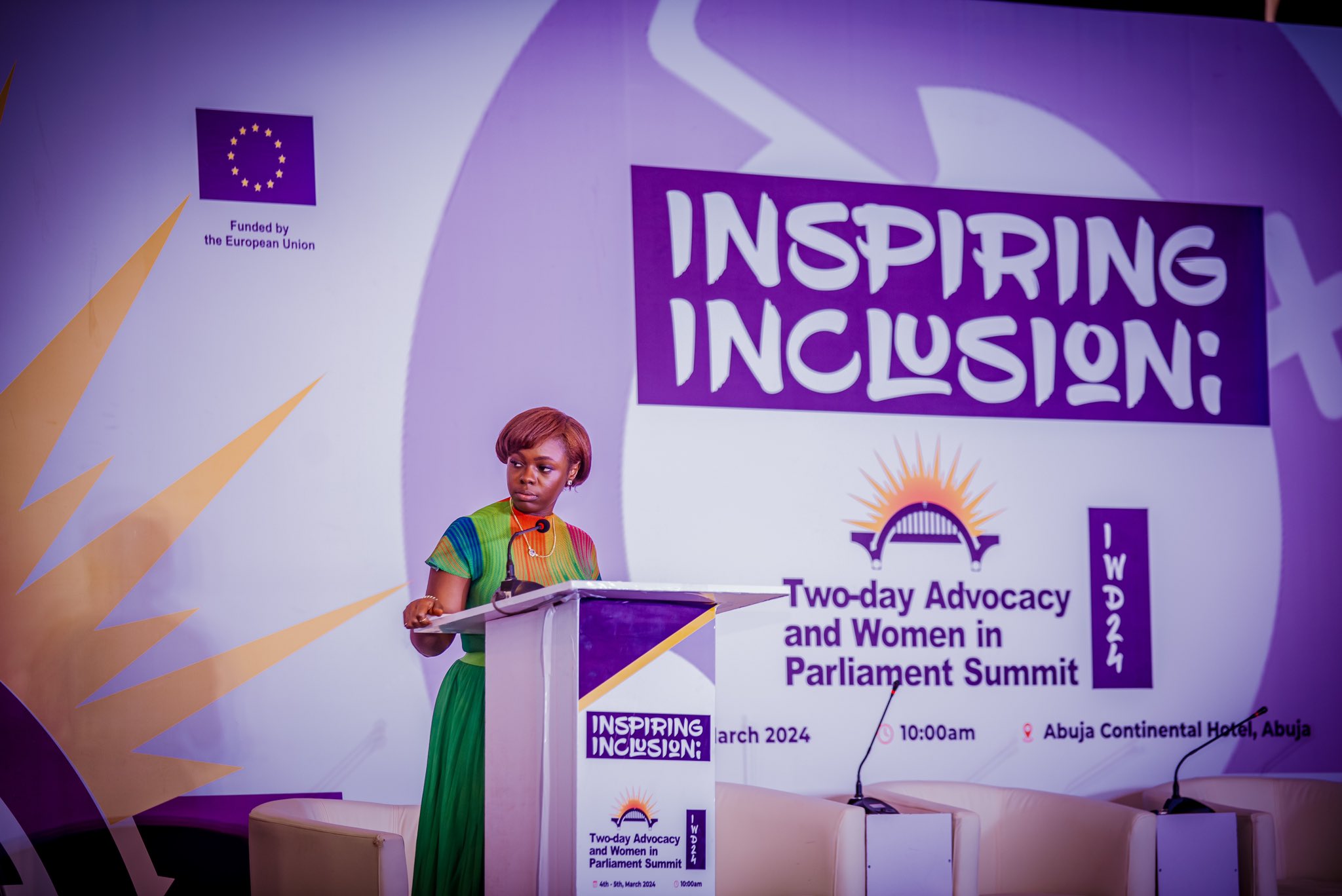Among the many memories of Nafisa Atiku’s childhood, one particularly grim sight stood out. Seated at the back of the school bus, which regularly ferried her to school, Nafisa saw children “of my age hawking things on the road while we waited for the traffic light to change,” she recalled.
Nafisa’s young mind grappled with these realities each day. “My young mind couldn’t understand why I had the opportunity to go to school, why they couldn’t have access to education.”
From these sights of inequalities, Nafisa came to see her own inequalities in a new light. Because of her age and gender, she was often denied access to many opportunities. Drawing on her experiences and the feelings of injustice she felt filled her with a desire to question the status quo and fight for equality and fairness.
Nafisa’s inclination towards politics and governance dates back to her family’s active interest in politics. This became a mark of distinction between her and her peers, as politics became a major weapon in her arsenal that she would deploy to bring about the change she desired to see.
“So I started by writing articles on governance and development on my Facebook page, and soon enough I started writing for Bella Naija and Y Monitor. Shortly after that, I joined the KOWA Party to have a deeper and richer political experience,” Nafisa told Prime Progress.
INEQUALITIES
However, politics in Nigeria has long been inaccessible to young females like Nafisa. Since the advent of democracy in Nigeria, an ageing, exclusively male elite has maintained a tight grip on political positions, barring women from leadership offices.
This stark underrepresentation of women was visibly illustrated in the 2023 national elections, with only 3 female senators and 16 female members in the Senate and House of Representatives, respectively.
This gender inequality in politics spurred Nafisa to abandon a career in law for public service.
Filling the Gap
Today, Nafisa Atiku aims to nurture women for political positions through mentorship and capacity-building programs, initiatives that were out of her grasp while growing up.
“Growing up, I found it really hard to find mentors who I could easily look up to. I couldn’t find anyone like that. So I had to do mentoring through books,” she said, explaining her motivation for starting her brand.
Nafisa’s brand took full form in 2023 but “has been working since at least 2016,” empowering women across Lagos, Ibadan and Abuja.
Yet Nafisa’s brand is more than a just a name. Part of her advocacy campaign involves creating vibrant and inclusive communities for young women to collaborate and thrive collectively. For these women, these close-knit platforms serve as safe spaces for dialogue, skill-sharing, and peer support. By fostering an environment of mutual empowerment, Nafisa nurtures a sense of belonging and camaraderie, enabling young women to overcome obstacles, celebrate their triumphs, and raise their voices as a formidable force.
Under Nafisa’s mentorship, amplified voices become catalysts for transformation, empowering women from diverse backgrounds to steer the trajectory of international development and drive meaningful changes within the private and public sectors alike. By prioritizing the aspirations and insights of young women, Nafisa drives profound change within the private and public sectors alike
The evils of stereotype and old politics
Bias against women, Nafisa acknowledges, are not likely to disappear soon. “Every female politician has faced them in their journey to have some sort of relevance in the sector, and it’s unfortunate. Female politicians are always encouraged to have thick skin, develop resilience and keep moving forward.”
As a young, enterprising woman spearheading such a brazen initiative, Nafisa has received some snide remarks in return. “Many underestimate me because I’m young and female. The harmful negative stereotypes fostered by our existing culture don’t help matters. People feel that a young woman like me shouldn’t be in politics, and I’ve had senior party leaders ask me if my husband has permitted me to pursue these aspirations.”
This is in addition to the country’s political landscape, which appears to resist political ambition by enterprising youths. “Or do we talk about how the political party system is rigged against young people and most especially young women? Most party’s definition of young people is people in their 40s and above. The few women in politics that exist mean that there are few or no older women to mentor the upcoming generation of female politicians. Let’s not even get into the expensive nature of politics and how dangerous it can be in terms of gender-based violence and harassment,” she added.
Building on her wealth of experience, Nafisa is passionate about the creation of affirmative action policies within political parties. “Because it’s usually at the primary level that the aspirations of many young female politicians die or fizzle out. Apart from the National Women’s Leader, you can find any female politician at the National Executive Council. If women are not represented at the political party level, how can women be represented at the sub-national and national levels? We need to have legislative measures put in place to balance the scales and ensure that women are adequately represented.”
While she remains steadfast in her commitment to building a more inclusive, equitable society for all, “I just want to see women, especially young women, represented in political party leadership and national leadership. However I achieve that, whether it’s through running for office, supporting other women, and building their capacity, I just want to see women represented,” Nafisa said.
Nafisa Atiku's childhood experiences of seeing children her age selling goods on the streets while she went to school instilled in her a strong sense of inequality. This awareness, coupled with her own barriers due to age and gender, ignited her desire to challenge the status quo and pursue social equality.
Nafisa's interest in politics stemmed from her family's active political involvement, leading her to write articles on governance and join the KOWA Party for richer political experience. However, the underrepresentation of women in Nigerian politics, highlighted by the 2023 elections, drove her to abandon a career in law for public service.
Her current goal is to mentor and empower women for political positions through initiatives that were unavailable to her while growing up. She has created vibrant and inclusive communities for young women to collaborate, share skills, and support each other, fostering a sense of belonging and mutual empowerment.
Nafisa acknowledges the persistent biases against women in politics but insists on the necessity of thick skin and resilience. She also emphasizes the difficulties young women face in politics due to systemic biases, lack of mentorship, and dangerous conditions.
Passionate about affirmative action policies within political parties, Nafisa advocates for legislative measures to ensure women are adequately represented. Her ultimate aim is to see young women represented in political and national leadership, whether through her own candidacy or by supporting and building the capacity of other women.






